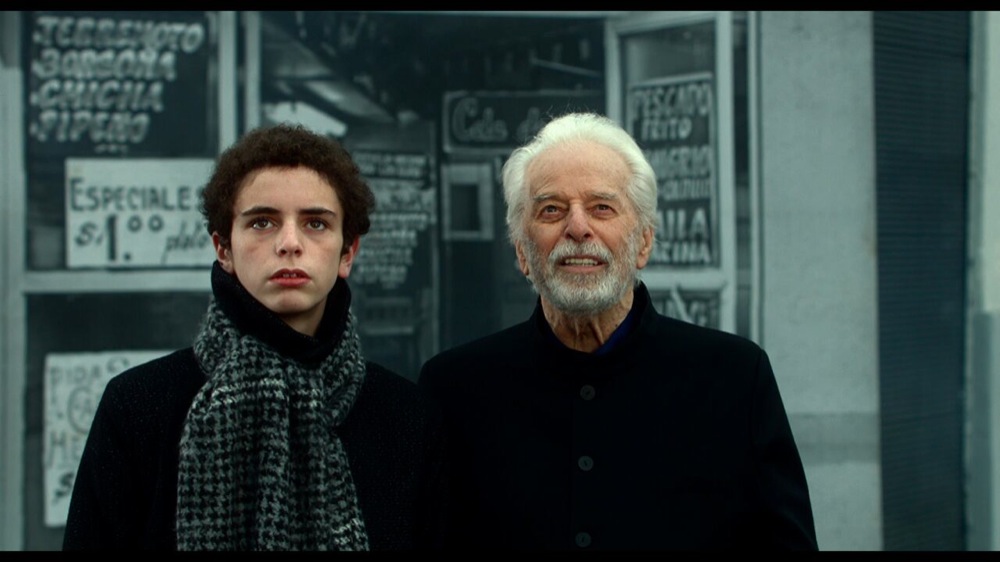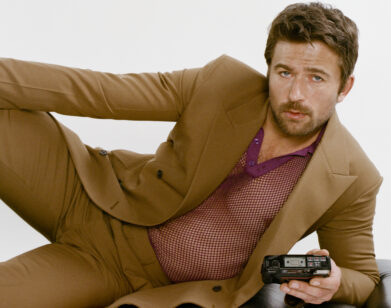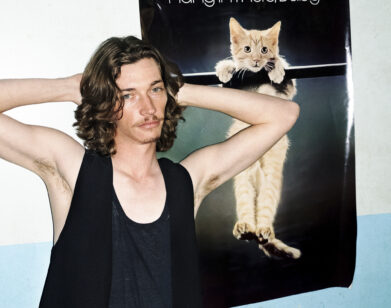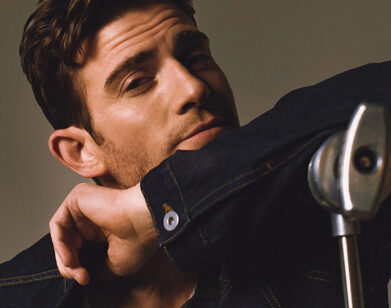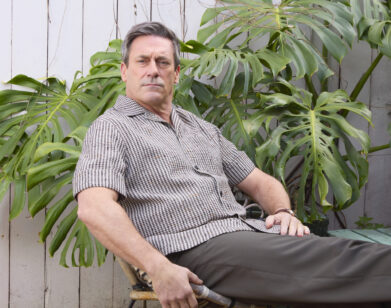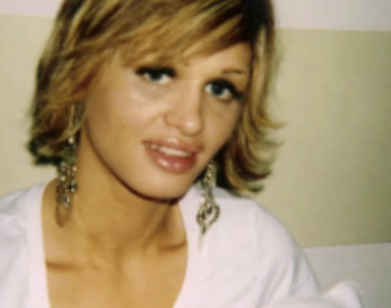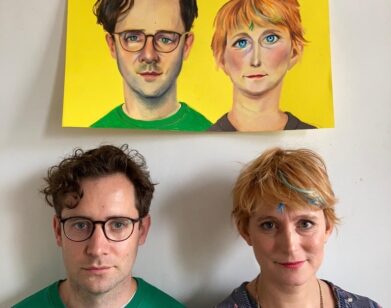The Eternal Search of the Jodorowskys
“How do you dream?” the legendary filmmaker Alejandro Jodorowsky asked Klaus Bisenbach earlier this month. He was at a special, sold-out conversation at the Museum of Modern Art, responding to the MoMA curator’s question about how he arrives at the indelible images in his movies. The 88-year-old Chilean director—famous for his phantasmagorical midnight-movie classics El Topo (1970) and The Holy Mountain (1973)—proceeded to tell about how he’d had trouble with a glass door in the office where he had been doing interviews that day. He pushed the door and pulled it, before finding it was a sliding door. “You don’t force,” he stated emphatically. “You receive. I receive what I can do.”
Jodorowsky, who has called Paris his home for many years, was in town to promote his colorful, lyrical, and expressive new film Endless Poetry, which tells the story of how the young Alejandro became a poet (as well as a puppeteer, clown, mime, and tarot enthusiast). In the beginning of the movie, the teenage Alejandro lives at home in Santiago, Chile with his brutal father and his well-meaning but stifled mother. Then he discovers poetry, leaves home, and falls in with a group of artists, poets, and dancers, where he makes his first real efforts to become his own person.
Endless Poetry was partially crowd-funded, and in one video for Kickstarter, Jodorowsky said that in making this movie, he wanted to convey how he was “obliged to the past.” He elaborated, “I knew how it was to live in poetry.” The film shows how he personally learned to unleash his creativity, open his mind and heart, and to “live with less, but … live well.”
He explained at the MoMA event that the main difference between who he was in the 1970s—at the height of his notoriety—and who is he now, was that in those days he had a big ego. Over the course of his life, Jodorowsky—who studied with a Zen Buddhist monk for five years and is a devoted practitioner of the healing arts—has worked on his own personal development a lot. He’s the inventor of psychomagic, a form of psychotherapy, about which he plans to make a documentary, and an expert on the tarot.
Jodorowsky experienced his own psychomagical healing of sorts during the making of Endless Poetry. For the first time in his life, he said at the MoMA conversation, Jodorowsky forgave his tyrannical father. While filming a fraught scene, in which the young Alejandro, confronts his father, Jodorowsky said “what I never could say in 80, 86 years of my life: ‘I forgive you.’ I did it there, crying.”
Interview recently met with Jodorowsky at the ABKCO offices on two separate afternoons before the release of Endless Poetry. One day, he was doing interviews with his youngest son, Adan, 37, a Mexico City-based musician, who is disarming in the movie’s leading role as the young Alejandro. (He also composed the music for Endless Poetry, as well as for its predecessor, the 2013 film The Dance of Reality.) Another day, his wife, Pascale Montandon-Jodorowsky—a 45-year-old painter who oversaw the film’s costumes and who worked closely with Alejandro on the brilliant color design of the film, with its lush greens, vivid reds, and boundless purples—accompanied him to the office, and we spoke with her briefly. It is heartening to see a renowned artist who is happy to share the spotlight and who clearly wants his wife and children to get credit and recognition for their work too. (His oldest son, Brontis, delivered a tour de force performance as Alejandro’s domineering father in Reality and he reprises his role to touching and very funny effect in Poetry.)
In a debonair black suit and with a full head of white hair, Jodorowsky doesn’t look 88, and his high spirits and definite lightheartedness don’t match the popular conception of old age either. He is good-humored, witty, and philosophical, and though he is passionate about many things, he is mellow.
“You come every day,” he suggests airily at the end of our second conversation. “We do a book of interviews.” He’s joking, but his openness is completely genuine.
JULIA YEPES: How are you today?
ALEJANDRO JODOROWSKY: Good. Every day is a good day.
YEPES: I see you’ve got your coffee.
ALEJANDRO JODOROWSKY: I don’t drink coffee too much, but the other day I read that coffee is good for the health. One coffee a day. And then I take one coffee a day.
YEPES: The other night at the MoMA event, you said that you worked on the colors for this film with your wife Pascale. How did you do that, and are the colors symbolic?
ALEJANDRO JODOROWSKY: I’ll call her and have her speak to you of that.
YEPES: I’d love that.
ALEJANDRO JODOROWSKY: [goes to door, opens it, and calls to some people near the waiting area] Have you seen Pascale?
BRITISH WOMAN: Pascale went to the florist to choose a flower.
ALEJANDRO JODOROWSKY: Ah. [closes door, returns to meeting-room table] I will tell you a story. We are friends with the granddaughter of Picasso, Diana Picasso, and yesterday, she invited us to her house for a reunion. She is a very agreeable person of art. Pascale was thinking, “We need to send flowers. How do we send flowers to her?” She has a beautiful house, a beautiful flower site. The best thing is to send one flower—one white flower—because in Zen history, there was a master of tea who had a garden only of beautiful white flowers, orchids. It was so beautiful, and a big general knew that, and he wanted to see the garden of the tea master. He sent a person to say, “Tomorrow, I will come to see your flowers.” And the next day he comes to see the flowers—and there are no flowers. He cut all the flowers. And the general becomes crazy and says, “How can he do that to me?” He goes inside to kill the master, and on the table was a vase with only one flower. And the master says, “Listen, I knew you would come to see my garden, and so I took out all the flowers, because I wanted to offer to you the most beautiful of all the flowers, and this is the most beautiful one.” And that is the story. It’s beautiful. And then I put that into practice. Give one flower that is the unity of the multiplicity of flowers.
YEPES: Why did you decide to cast the actress who plays your mother in the film in another role, as your romantic interest and muse?
ALEJANDRO JODOROWSKY: First, I know because I studied a lot of psychoanalysis that the way we love is that the first love we have is our mother or father. And then we project the love of the mother onto a woman. It’s a projection—the first love is a projection of the mother. And step-by-step, we come to the person we love, really. The first love is the love of the mother, and in the love of mother, we have the desire for the mother that we refuse to accept.
My mother was a repressed person. She repressed whatever she wanted. In the picture, you see she has a corset. All the time she was tied and she never realized herself. She was constricted.
Inside my mother is the redheaded woman who was the contrary. I had the same actor who played my mother play this very powerful woman. I was scared of her, and then liberated by her. That is why I used the same actress, some kind of psychoanalytic thing.
YEPES: Can you tell me how you decided to have the dialogues between your older self and your younger self in this movie and in The Dance of Reality?
ALEJANDRO JODOROWSKY: Because it’s like this until you become what the Zen Buddhists call illuminated. Illumination acts like a unity, not like a duality. There’s myself and myself looking at myself. The essential being, what we are, has no age. It’s perfect at the moment we are born, but after that, there’s the artificial personality, the self-concept that is formed by the family, the society, the culture. They sculpt us in an ego that is not our real personality.
We are divided. We are speaking with our self all the time. We are seeing ourselves looking. We are seeing ourselves living. There’s only one moment for a person when you are you. In the orgasm, the duality finishes in a complete unity. You have big pleasure, and then you come to the duality a new time, seeing yourself. In an orgasm, having the pleasure is not the real pleasure. And in illumination, it’s the same thing. There’s a moment when you come to yourself.
When I read the tarot, I say what I say. And five minutes later I forget completely. I have no memory of that—because I am not seeing myself doing. I do! And then the memory disappears. You do these things, and it’s like a cat. A cat has no memory of what he does. But a horse has memory, eh?
YEPES: They do?
ALEJANDRO JODOROWSKY: Yes, if a horse is scared in one moment, the next day when he goes there, he’s scared. He remembers. The animal doesn’t have intellect or self-concept. We are living most of the time in a self-concept.
YEPES: Yes. I think you were saying at MoMA that your view of the past, your memory of it, has changed. You changed your memory—
ALEJANDRO JODOROWSKY: Yes.
YEPES: By making this movie.
ALEJANDRO JODOROWSKY: I liked the old Hollywood pictures I saw as a child a lot, and many of them, like The Hunchback of Notre Dame, were black and white. In time, they started to colorize the old pictures. All the people said, “What a crime! By coloring this picture, you’re killing it!” But I really like to see that we can color the past. I started to do that in my memories. I thought, “In that place, I suffered a lot.” And then in my memory, where there was a window with an ugly landscape, I will add trees or a beautiful landscape. I will change the furniture. I will make beautiful things. I started to work on changing the characters. My mother is repressed and wanted to be an opera singer—I will make her a singer. I will realize her. My father, who was so terrible, becomes a big philosopher. He’s a Zen master. I changed him.
The memory is what happened seen by a person who has one age. It’s a point of view you memorize, but you don’t memorize the real reality, because the real reality’s enormous, infinite. We are making this conversation; it’s not the same as reality. I changed my reality, but I started with the reality. I opened my mind.
My father was a boxing champion. I was terrified all my life of my father. One day, I said, “Bueno, this is a child’s vision.” Then in the picture I made, I kicked my father. I lost the terror of my father—because I realized at this age I was in the picture, I could vanquish my father. I have this image of a strong father because I was a seven-year-old child.
YEPES: You also make it funny. It wasn’t funny at the time, but you find the humor in past events, like when there’s an earthquake, and your father’s shouting, “It’s just a tremor. Don’t let fear rule you!” Meanwhile, massive cracks appear in the walls and the house is shaking like mad.
ALEJANDRO JODOROWSKY: But he did that. It was really history. The church that is trembling in that scene was the real church that trembled, and the dogs are barking: “Bow wow wow.” This is reality. I lived that, but I showed that like a film, no? It’s a stylization of the situation. It’s important to see that. I show the character of the father. He’s not a bad person; he’s a limited person. It’s different. My mother is not ridiculous; she’s a limited person. No one is a bad person, even a criminal. He’s a limited person. Any person. We need to realize that.
Terrorists are not bad; they are limited by circumstances. They are human beings. I am very, very, very sad when they explode themselves and kill 40 to 60 persons. It’s terrible. But also, I am sad for them, a young person who lost his whole life. It’s terrible. They are limited by religion, by politics, by economical interests.
I need to make art. I cannot use the person as they were. I need to make artistic, beautiful form, but if my father is there, who will play my father? One of my sons. Who will play me? A son I love—because I love Adan. When he came to the world, Adan, my life changed. Really. It changed my life as his son, Alion, changed his life. It was important for me to use a person who is in my heart, really, because I love myself—I am not a narcissist, but I am very happy to be inside this body. Inside art, we are happy.
This is the thing: Art is more important than making a show, something that amuses people. Art is something that needs to give to the public, to the actors, to the artist—to give something that makes life the paradise it can be. Life can be a paradise. Still, I believe that. Even if there is Trump, there can be a paradise.
[Adan Jodorowsky enters the room.]
YEPES: Adan, I’m curious to hear about your experiences working with your father. What did this role mean to you?
ADAN JODOROWSKY: A lot. I had to play my father so first I had to lose 10 kilos for the movie because my father was really skinny at this time. I had to learn my lines again, because I hadn’t been acting for a long time, but it was filmed in chronological order, so I started like a naive guy, and I was more secure with the passing weeks, and so, at the end, I was opening myself. It was perfect for the story, because he starts very shy and he opens, opens, opens. And it was a strong moment because he had to heal something, I think… [to Alejandro] You had to heal something with your father. [Alejandro nods] So if he heals something with his father, I heal something in me too. After the movie, I was another person. In fact, I shaved my hair and I went to the desert in a Tacoma and I buried my hair in the desert, and then I started to do a lot of ceremonies, and then I had a kid, and my life changed completely. My artist name was Adanowsky before, now it’s Adan Jodorowsky again, so I accepted myself the way I am.
YEPES: Alejandro, you were 50 years old when Adan was born. In one interview, you said it took you almost half a century to really feel good. By your 40s, you felt that like you were making progress and finding yourself.
ALEJANDRO JODOROWSKY: Yes.
YEPES: Before that, you were searching—
ALEJANDRO JODOROWSKY: No, I still am like that. I’m searching. I am beginning. I feel, really, I am beginning.
ADAN JODOROWSKY: Me too.
ALEJANDRO JODOROWSKY: There are 50 years I’ve studied the tarot cards, and today I have ideas I never had. I’m still learning. Some persons say, “You are a master.” No, I am not a master. I am the eternal disciple.
YEPES: Well, but you’ve undergone a transformation that has been incredible, because you were pretty angry when you were young, right?
ALEJANDRO JODOROWSKY: Sure.
YEPES: And now you seem happy, and it seems like you really love sharing knowledge and wisdom with people.
ALEJANDRO JODOROWSKY: Life is a way of perfection. You need to work on yourself. You become a good person. If you do your work you will discover sublime feelings. First, when I ask a person, “What is your goal in life?” the person says, “Oh, to love, to be loved, to make a lot of money, to travel.” They say what they want, but only what they want. They never say, “I am human. I want this society to change. There are a few who have a lot, and a lot who have little.” The economy needs to be changed. We cannot continue this way. That is my goal—peace for everybody. Not the business of war. To discover what is real love—this is the work, no? I say, “What you give, you give to yourself. What you don’t give, you don’t give to yourself.”
YEPES: I wanted to ask you both something. When I was younger, I always thought it was better to make great art than to be a person whose greatest work is his or her self.
ADAN JODOROWSKY: It’s very important to think about that. When you create, and you have a goal of success, for example, and you reach the success, and you reach the money also, and you reach all those big dreams, what’s after that? Who are you? You’re the same person, so you have to work on another thing, no? You have to grow up, and to grow your consciousness also. [You have] to be a seed for the world; to be a seed for the universe. I feel that I am a seed, and we are all seeds, and that’s why we are alive—because we are here to be seeds, to make consciousness grow.
ALEJANDRO JODOROWSKY: Yeah, fantastique. What would I ask of a seed? Be happy to be a seed. If the seed is not happy to be a seed, the tree will be awful. How to make the seed grow well? Difficulties. Because you need to fight in order to count. Don’t be afraid to believe the impossible and then fight with yourself to ameliorate yourself. Do it. Believe in yourself. Let a good seed be a good seed now, and then we’ll have a good tree.
YEPES: What do you think is more important in life: Self-actualization or making art? Does everyone need to do both? Or is self-realization the ultimate art?
ALEJANDRO JODOROWSKY: I think in life, it depends on your talent. Every person has a talent, but not the same one. Every person has to discover his personal talent and go with his talent. And then you are you, and what you do, you do because you love what you do, not because you want to be famous or because you’re making money. You do the work because you love it.
ADAN JODOROWSKY: You know for years, I wanted to be an actor because I wanted to be a star and I wanted to feed my ego. But with time and being a father—I’ve been playing a lot, and doing tours, and doing movies—I realize it is a horrible world, the world of famous people. It’s only ego. They only want to feed ego, that’s all. And so, I don’t want to be part of that. Now that I’ve played a mean character in a movie, I realize I don’t care about that. I care about doing a piece of art, something useful for the world, too. So I don’t have these dreams anymore.
YEPES: When you were in Santa Sangre—
ADAN JODOROWSKY: I was eight.
YEPES: At that point, did you want to be an actor?
ADAN JODOROWSKY: I saw my father creating all his life. I saw my father writing from 11 A.M. to 9 P.M., all the days. I saw that all my life, so I’m passionate about art. I had an incredible example, so yes, I wanted to be an artist. At school, they said, “What do you want to be?” I said, “I want to be a poet! I want to be a writer! An actor!” And then when my father said, “So do you want to do Santa Sangre?” I said, “Yes.” And he said, “All right, you’re going to do it.” He slapped my face. He said, “That’s to remember you have to do it well.” I cried and cried, and years and years after—almost 20 years after—we did a TV show in Spain. He called me to this TV show—which has an audience of 3 million people—and he said, “You remember 20 years ago, I slapped you in the face because I wanted you to play well in the movie?” “Yes, I remember.” “Now you have to give me back the slap.” And I slapped him in front of 3 million people. [all laugh] It was beautiful.
ALEJANDRO JODOROWSKY: We are a family of artists. I suffered a lot because I didn’t find a woman who really loved the art in a pure way. And in the end, after 54 years, I found the woman of my life.
YEPES: And she’s a painter.
ALEJANDRO JODOROWSKY: A painter. We make the colors of the movies together—for the colors, she is better than me—and she makes the costumes. We collaborate. It’s fantastic. There, I find happiness. Today I was thinking, “Maybe Adan was not made with the right woman. Who would Adan be with another woman, with Pascale as his mother?” Then I said, “No. That’s not the way to think. She was the perfect woman. She made Adan, who I love so much. He’s perfect to me. And she was perfect. But not perfect for me.”
[The next day, at the ABKCO offices with Pascale Montandon-Jodorowsky and Alejandro Jodorowsky]
YEPES: Pascale, the colors were so striking in the movie, and I understand that you and Alejandro worked on the color design together. How did you do that?
PASCALE MONTANDON-JODOROWSKY: We did it as [the collaborative name under which they work as artists] PascALEjandro—because of course, this is Alejandro’s vision. This is Alejandro’s movie, so he is involved at each part of the process. Nobody ever talks about this part of the work, and it’s so important because with different colors, it’s another film. You can change the meaning of a scene with another light, with coldness or warmth. We were in the theater, looking at the screen, and we worked with the technician, image by image. We told him, “More red, more blue,” exactly as you would for a painting. “More light for this detail.” The idea was to bring Alejandro’s vision to a higher level. It was, of course, my interpretation of what I understood Alejandro wanted to say with a visual vocabulary.
YEPES: In the waiting room, I was talking with another journalist and the first thing he said about the movie was that the colors were unbelievably beautiful.
MONTANDON-JODOROWSKY: I’m happy to hear that because this is not a realistic way to do cinema. Each second of the film reminds you, “This is cinema. This is a poetic interpretation of reality, even if everything in this movie is real.” It’s important to remind ourselves that the cinema is an art. You’re telling the story not just for the dialogue, but this is a vocabulary that is very visual and very rich—the colors, the materials. This is a real visual vocabulary, and of course we use the color in a poetic way, like a painting, because it’s true that colors are not neutral, there is meaning and power in the colors.
As an artist, the best thing you can talk about is yourself because the material you use is yourself: your experiential feeling, your being, your art on different levels—emotionally, personally. When people, for example, at Cannes, saw the film, it spoke to a personal part of them. That’s why, even though it’s personal history, at the same time, it is transpersonal—because he used his personal experience in order to help people and to tell them you can also sublimate your memory. You can heal yourself, heal your soul, and get better.
YEPES: There are interesting touches. Café Iris is very stylized and it seems like almost everyone is passed out on the table in front of them.
MONTANDON-JODOROWSKY: Yes, I think it’s an exaggeration of the quotidian life, but when you exaggerate, you can see things that you don’t see anymore. You don’t have to be slaves, to accept certain situations, and every one of us can be free. It’s a lesson and a process of the character of Alejandro in the film—he, more and more, finds himself and is searching himself. He breaks his own limits, in order to be free and to find his soul. I think Alejandro does that to show people that they don’t have to accept these situations. Everybody doesn’t have to be artist or a poet, but he has to be himself.
ENDLESS POETRY IS NOW PLAYING IN SELECT THEATERS.

